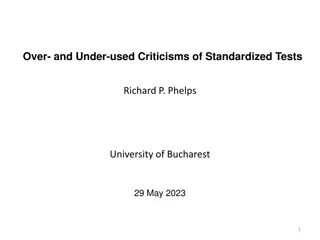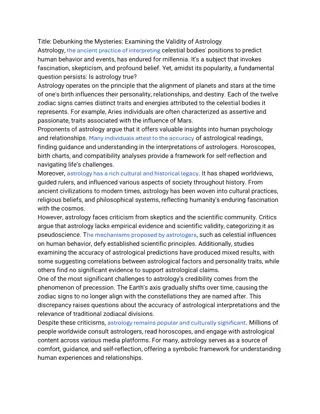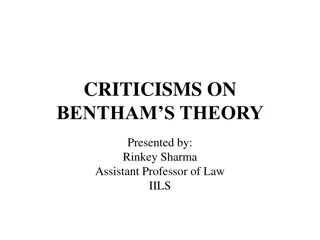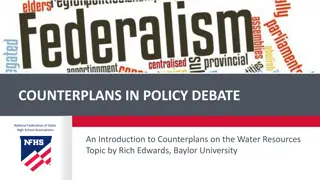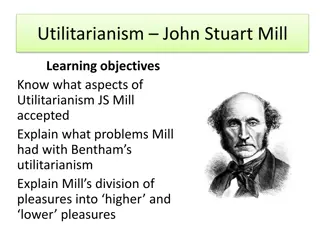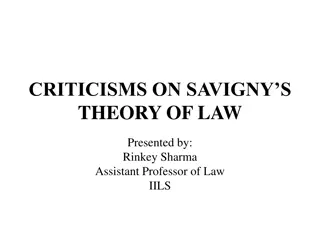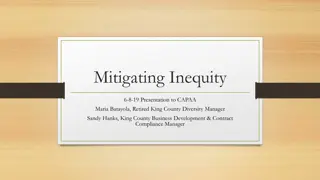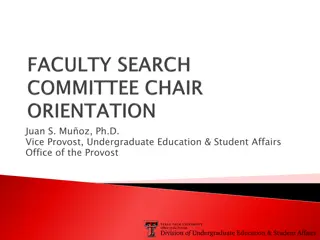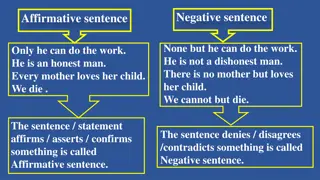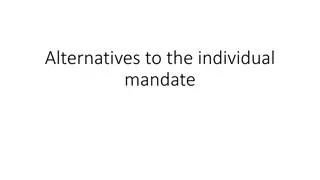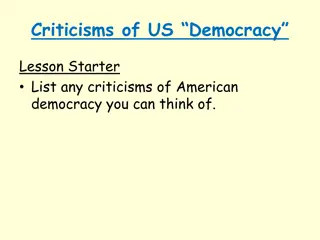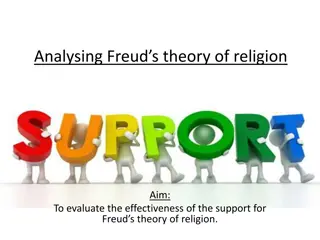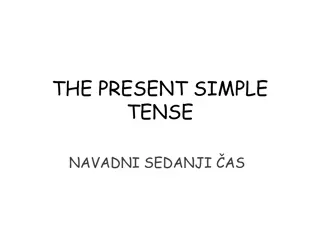Affirmative Action: Origins and Criticisms
Affirmative Action was first proposed in the US by President John F. Kennedy in 1961 to combat discrimination. It aimed to prevent discrimination based on race, color, religion, sex, and national origin. This policy evolved into two forms: Strong Affirmative Action, which involves preferential treatment for under-represented groups, and Weak Affirmative Action, which focuses on increasing opportunities for disadvantaged individuals. Philosopher Pojman provides critiques of arguments supporting Affirmative Action, questioning the need for role models and the concept of reverse discrimination.
Download Presentation

Please find below an Image/Link to download the presentation.
The content on the website is provided AS IS for your information and personal use only. It may not be sold, licensed, or shared on other websites without obtaining consent from the author.If you encounter any issues during the download, it is possible that the publisher has removed the file from their server.
You are allowed to download the files provided on this website for personal or commercial use, subject to the condition that they are used lawfully. All files are the property of their respective owners.
The content on the website is provided AS IS for your information and personal use only. It may not be sold, licensed, or shared on other websites without obtaining consent from the author.
E N D
Presentation Transcript
Origin 0 Affirmative Action was first used in the US. 0First proposed by President John F. Kennedy on March 6, 1961. 0It was used to fight discrimination.
0The order instructed federal contractors to avoid discrimination of race, color, religion, sex, or national origin. 0The Civil Rights Act of 1964 extended Kennedy s order including nongovernmental contractors, making employment discrimination illegal on the basis of sex, color, religion or any other ground. 0To remedy past injustices
Pojman: 9 arguments against Affirmative Action He distinguish strong affirmative action vs. weak affirmative action
By Strong Affirmative Action I mean preferential treatment on the basis of race, ethnicity or gender (or some other morally irrelevant criterion), discriminating in favor of under-represented groups against over-represented groups, aiming at roughly equal results. Strong Affirmative Action is reverse discrimination. It says it is right to do wrong to correct a wrong. It is the policy that is currently being promoted under the name of Affirmative Action. I will not argue for or against the principle of Weak Affirmative Action. Indeed, I think it has some moral weight. Strong Affirmative Action has none. (Pojman)
Weak Affirmative Action: Policies that will increase the opportunities of disadvantaged people to attain social goods and offices. It includes the dismantling of segregated institutions, widespread advertisement to groups not previously represented in certain privileged positions, special scholarships for the disadvantaged classes, and even using diversity or under representation of groups or history of past discrimination as a tie breaker when candidates for these goods and offices are relatively equal. (Pojamn)
I. A Critique of Arguments For Affirmative Action In the following, Pojman offers criticisms of the main arguments for affirmative action.
1. The Need for Role Models We all need role models, and it helps to know that others like us can be successful. 0 It s not clear that role models like us are necessary or sufficient for success. 0 One of my heroes was Gandhi, an Indian another Martin Luther King. 0 More important is having genuinely good people, to emulate. 0 Our common humanity should be a sufficient basis for us to see the possibility of success in people of virtue and merit.
0"role-models-just-like-us" is to treat people like means not ends: elevate morally irrelevant particularity over relevant traits, such as ability and integrity. 0What good is a role model who is inferior to other professors or physicians or business personnel? 0This attitude led to "Is she in this position because she merits it or because of Affirmative Action?"
0Affirmative Action creates a stigma of undeservedness, whether or not it is deserved. 0Finally, a thought experiment. Tall handsome white males make the best role models for the most people. Even large numbers of minority people find inspiration in tall white males. Would we be justified in hiring tall handsome white males over better qualified short Hispanic women, who were deemed less role- model worthy?
2. The Compensation Argument Blacks have been wronged and severely harmed by whites. Therefore white society should compensate blacks for the injury caused to them. Reverse discrimination? This argument is a distortion of compensation. Normally, we think of compensation as owed by a specific person to another person. 0 For example, if I have stolen your car and used it to make business profits that would have gone to you, it is not enough that I return your car. I must pay you an amount reflecting your loss. If I have only made $5,000 and only have $10,000 in assets, it would not be possible for you to collect $20,000 in damages - even though that is the amount of loss you have incurred.
0True, sometimes compensation is extended to groups of people. 0For example, West German has paid reparations to the survivors of Nazi concentration camps. 0But here a specific people have been identified who were wronged in an identifiable way by the government of the nation in question. 0On the other hand, demands by blacks for compensation does not fit this pattern.
0Perhaps Southern States with Jim Crow laws could be accused of unjustly harming blacks, but it is hard to see that the US government was involved in doing so. 0Much of the harm done to blacks was the result of private discrimination, not state action. So the Germany/US analogy doesn t hold. 0Furthermore, it is not clear that all blacks were harmed in the same way or whether some were unjustly harmed or harmed more than poor whites and others. 0Finally, even if identifiable blacks were harmed by identifiable social practices, it is not clear that most forms of Affirmative Action are appropriate to restore the situation.
0High level jobs to someone unqualified or only minimally qualified, who, speculatively, might have been better qualified had he not been subject to racial discrimination is not fair. 0If John is the star of our college team with a promising professional future, and I accidentally cripple him, John may be due compensation, but not due the spot on the football team.
(1) Treating people according to their merits respects them as persons, as ends in themselves, rather than as means to social ends. (2) Society has given people expectations that if they attain certain levels of excellence they will be awarded appropriately. (3) Filling the most important positions with the best qualified is the best way to insure efficiency in job- related areas and in society in general.
3. The Argument for Compensation from Those Who Innocently Benefitted from Past Injustice Young White males as innocent beneficiaries of unjust discrimination of blacks and women have no grounds for complaint when society seeks to level the tilted field. They may be innocent of oppressing blacks, other minorities, and women, but they have unjustly benefitted from that oppression or discrimination.
0Judith Jarvis Thomson puts it this way. "Many [white males] have been direct beneficiaries of policies which have down-graded blacks and women...and even those who did not directly benefit...had, at any rate, the advantage in the competition which comes of the confidence in one's full membership [in the community], and of one's right being recognized as a matter of course." That is, white males obtain advantages in self-respect and self-confidence deriving from a racist/sexist system which denies these to blacks and women.
0If A steals B's car and wrecks it, A has an obligation to compensate B for the stolen car, but A's son has no obligation to compensate B. Furthermore, if A dies or disappears, B has no moral right to claim that society compensate him for the stolen car. 0Bottom line: Sometimes a wrong cannot be compensated, and we just have to make the best of an imperfect world
0 Suppose my parents bought an expensive growth hormone for me. A neighbor stole it and gave it to little Michael, who gained the extra 13 inches and shot up to 6 6 . Michael, known as Michael Jordan profited from the injustice and excelled in basketball. 0 Do I have a right to the millions of dollars that Jordan made as a professional basketball player the unjustly innocent beneficiary of my growth hormone? I have a right to something from the neighbor who stole the hormone. As far as I can see, however, he does not owe me anything, either legally or morally.
0 Suppose further that Michael Jordan and I are in high school together. Do I deserve to start in his position because I would have been as good as he is had someone not cheated me as a child? 0 But if being the lucky beneficiary of wrong-doing does not entail that Jordan owes me anything in regards to basketball, why should it be a reason to engage in preferential hiring in academic positions or highly coveted jobs? 0 If minimal qualifications are not adequate to override excellence in basketball, even when the minimality is a consequence of wrongdoing, why should they be adequate in other areas?
4. The Diversity Argument It is important that we learn to live in a pluralistic world, learning to get along with those of other races and cultures, so we should have fully integrated schools and employment situations. We live in a shrinking world and need to appreciate each other s culture and specific way of looking at life. Diversity is an important symbol and educative device. Thus preferential treatment is warranted to perform this role in society.
0 There is some truth here. Diversity of ideas challenges us to scrutinize our own values and beliefs, and diverse customs have aesthetic and moral value, helping us to appreciate the novelty and beauty in life. 0 Diversity may expand our moral horizons. But, again, while we can admit the value of diversity, it hardly seems adequate to override the moral requirement to treat each person with equal respect. 0 Diversity for diversity's sake is moral promiscuity, since it obfuscates rational distinctions, undermines treating individuals as ends, treating them, instead as mere means
0 I do not care whether the group of surgeons operating on me reflect racial or gender balance, but I do care that they are highly qualified. Neither do most football or basketball fans care whether their team reflects ethnic and gender diversity, but whether they are the best combination of players available. 0 On the other hand, if a black policeman, though lacking formal skills of the White policeman, really is able to do a better job in the Black community, this might constitute a case of merit. This is similar to the legitimacy of hiring Chinese men to act as undercover agents in Chinatown.
5. The Equal Results Argument Some philosophers and social scientists hold that human nature is roughly identical, so that on a fair playing field the same proportion from every race and ethnic group and both genders would rise to the highest positions in every area of endeavor. It would follow that any inequality of results itself is evidence for inequality of opportunity.
0 Low scores by blacks can be traced in large measure to the legacy of slavery and racism: segregation, poor schooling, exclusion from trade unions, malnutrition, and poverty have all played their roles. 0 Unless one assumes that blacks are naturally less able to pass the test, the conclusion must be that the results are themselves socially and legally constructed. Obviously blacks have been treated unequally throughout US history.
0 However, there are innate differences between races, sexes, and groups. If there are genetic differences in intelligence and temperament, why should we not expect such differences between racial groups and the two genders? Why should the evidence for this be completely discounted? 0 Some say: Since we don t know for certain whether groups differ in talent, we should presume that they are equal in every respect. 0 But the logic is flawed. Under a situation of ignorance we should conclude that we don t know what the results would be in a just society.
0Consider this analogy. Suppose that you were the owner of a National Basketball Association team. Suppose that I and other frustrated White basketball players bring a class-action suit against you for discrimination, when you respond to our charges that you are just responding to individual merit, we respond that the discrimination is a function of deep prejudice against White athletes. Would you not be in your rights to defend yourself by producing evidence, showing that average physiological differences exist between Blacks and Whites, so that we should not presume unjust discrimination?
0The fact that Asians are producing 50% of PhDs in science and math in this country and blacks less than 1% clearly shows, on this reasoning, that we are providing special secret advantages to Asians. By this logic, we should reduce the quota of Blacks in the NBA to 12%. 0But why does society have to enter into this results game in the first place? Why do we have to decide whether all difference is environmental or genetic? Perhaps we should simply admit that we lack sufficient evidence to pronounce on these issues with any certainty - but if so, should we not be more modest in insisting on equal results?
6. The "No One Deserves His Talents" Argument Against Meritocracy According to this argument, the competent do not deserve their intelligence, their superior character, their industriousness, or their discipline; therefore they have no right to the best positions in society; therefore it is not unjust to give these positions to less (but still minimally) qualified blacks and women.
Outline form: 1. Society may award jobs and positions as it sees fit as long as individuals have no claim to these positions. 2. To have a claim to something means that one has earned it or deserves it. 3. But no one has earned or deserves his intelligence, talent, education or cultural values which produce superior qualifications. 4. If a person does not deserve what produces something, he does not deserve its products. 5. Therefore better qualified people do not deserve their qualifications. 6. Therefore, society may override their qualifications in awarding jobs and positions as it sees fit.
0Premise 4 is false. Just because I do not deserve the money that I have been given as a gift does not mean that I am not entitled to what I get with that money. If you and I both get a gift of $100 and I bury mine in the sand for 5 years while you invest yours wisely and double its value at the end of five years, I cannot complain that you should split the increase 50/50 since neither of us deserved the original gift.
II. Arguments Against Affirmative Action
1. Affirmative Action Requires Discrimination Against a Different Group 0 Weak Affirmative Action weakly discriminates against new minorities, mostly innocent young white males, and Strong Affirmative Action strongly discriminates against these new minorities. 0 Recently I had this experience. I knew a brilliant philosopher, with outstanding publications in first level journals, who was having difficulty getting a tenure-track position. For the first time in my life I offered to make a phone call on his behalf to a university to which he had applied. When I got the Chair of the Search Committee, he offered that the committee was under instructions from the Administration to hire a woman or a Black. They had one of each on their short-list, so they weren t even considering the applications of White males. He retrieved my friend s file, and said, "This fellow looks far superior to the two candidates we re interviewing, but there s nothing I can do about it.
0Cases like this are regular. In fact, it is poor white youth who become the new pariahs on the job market. 0The children of the wealthy have no trouble getting into the best private grammar schools and, on the basis of superior early education, into the best universities, graduate schools, managerial and professional positions. 0Affirmative Action simply shifts injustice, setting Blacks, Hispanics, Native Americans, Asians and women against young white males, especially ethnic and poor white males.
8. Affirmative Action Encourages Mediocrity and Incompetence At several universities, the administration has forced departments to hire members of minorities even when far superior candidates were available. Shortly after obtaining my PhD in the late 70's I was mistakenly identified as a black philosopher (I had a civil rights record and was once a black studies major) and was flown to a major university, only to be rejected for a more qualified candidate when it discovered that I was white. 0Americans are wondering why standards in our country are falling and the Japanese and Koreans are getting ahead. Affirmative Action with its twin idols, Sufficiency and Diversity, is the enemy of excellence.
9. An Argument from the Principle of Merit 0Traditionally, we have believed that the highest positions in society should be awarded to those who are best qualified. The Koran states that "A ruler who appoints any man to an office, when there is in his dominion another man better qualified for it, sins against God and against the State". 0Rewarding excellence both seems just to the individuals in the competition and makes for efficiency.
The case for meritocracy has two pillars. One deontological: we ought to treat people as ends and not merely means. By giving people what they deserve as individuals, rather than as members of groups we show respect for their inherent worth. The second pillar for meritocracy is utilitarian: In the end, we will be better off by honoring excellence. We want the best leaders, teachers, policemen, physicians, generals, lawyers, and airplane pilots that we can possibly produce in society
Conclusion 0Our goal is justice for all. The question is how best to get there. 0Weak Affirmative Action is ok but it easily slides into Strong Affirmative Action. 0Affirmative Action aims at the higher levels of society - universities and skilled jobs, but if we want to improve our society, the best way to do it is to concentrate on families, children, early education, and the like, so all are prepared to avail themselves of opportunity.
0Martin Luther said that humanity is like a man mounting a horse who always tends to fall off on the other side of the horse. This seems to be the case with Affirmative Action. 0Attempting to redress discrimination in new forms of discriminatory iniquity is like falling off on the other side of the issue.


